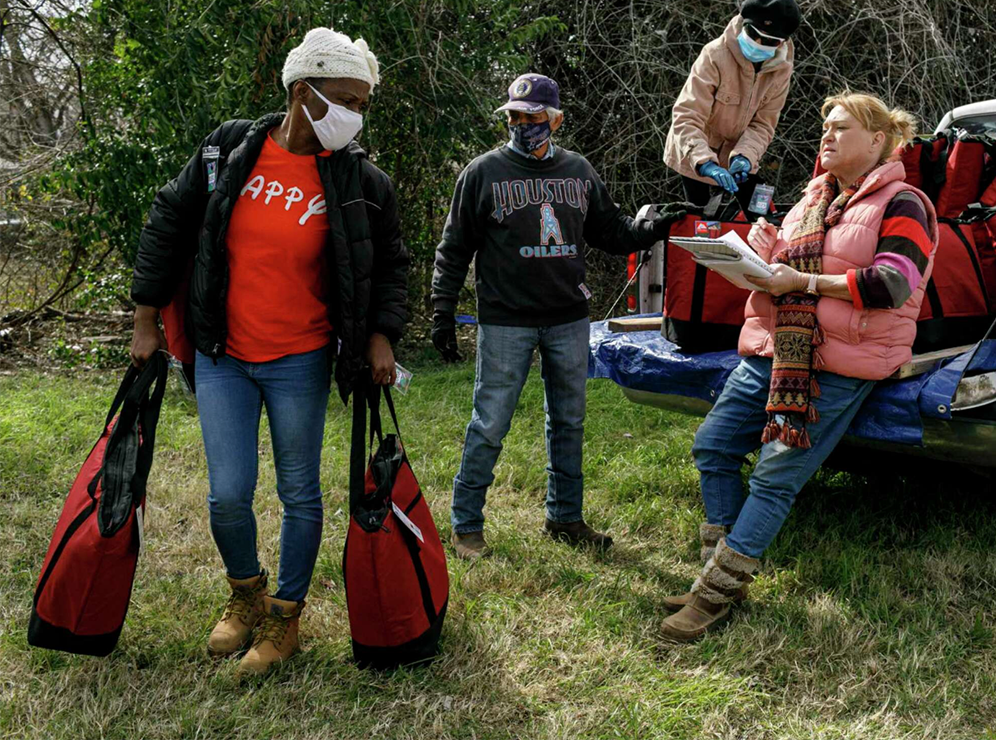
Clad in a blue wool sweater, thick black leggings and boots, Angie LaPenta lifted bags of food into the bed of a truck on a recent Saturday afternoon. She wore a black beret over silver hair, pulled snug over her ears. As she worked, a silver chain and crucifix reflected the midday sunlight atop her dark pullover.
The 84-year-old inspiration was one of 50 volunteers loading cars and trucks with meals and packs of bottles to hand out to the homeless community during Pastor Shetigho Nakpodia’s “1,000 Plates for the Hungry” DreamWeek event.
When photojournalist Sam Owens and I visited Redeemer’s Praise Church on South Pine for the event, we knew we had the makings of a Monday column within minutes of meeting LaPenta.
During a break, she shared stories about helping those who live in the shadows of the city. On Christmas morning, LaPenta’s friend Carlos Cantú stopped his white pickup near the Hays Street Bridge on the East Side, where the homeless lay tucked away in makeshift camps, out of sight.
LaPenta opened the passenger side door and called out to the unseen that she had presents for them. When a young woman came her way, LaPenta handed her one of the bundles, along with her blessings. Then the woman asked LaPenta if she could have another gift, for her mother, who slept beside her under the bridge.
“It broke my heart,” LaPenta said. “When you see people without shoes, it’s heartbreaking.”
LaPenta is one of the many residents who feed, clothe and uplift San Antonio’s homeless without fanfare. For the past year, she’s been one of Nakpodia’s volunteers who travel across the city to feed the unsheltered.
At the event, Nakpodia hugged LaPenta, who is a whisper below 5 feet tall. Dressed in a yellow and purple motif-head wrap and full-length dress, the pastor said Cantú and LaPenta also trim the trees around the rust-painted church. The pastor said the slim grandmother, who does yoga, carries away tree stumps without help.
“She’s out here every Saturday,” Nakpodia said. “She’s amazing.”
LaPenta was born and raised in Natalia, 30 miles from San Antonio. She learned compassion and how to tend to the sick when she helped care for her mother, bedridden for eight years. Her mother died when LaPenta was 10.
“She taught me how to love, how to respect people and that we are all the same under the eyes of God,” LaPenta said
The octogenarian has known the aches and pains of hard labor since she was a child. She worked in the fields of West Texas with her family, hunched over, picking crops that included cotton, green beans, black-eyed peas and strawberries. After her mother died, she joined her father, brother and seasonal migrant workers in picking sugar beets in Colorado.
LaPenta is the last of six siblings still living.
By 1968, she had been a single mother of three children for 10 years. Her doctor said LaPenta was so thin she’d have to be hospitalized if she didn’t relocate to the city. She moved her family to San Antonio, where she met her future husband, Frank J. LaPenta.
It wasn’t love at first sight for her. Her kids fell in love with the man who played softball with them and other youngsters on their street. She recalled he would stare at her during the games. Smitten, he proposed two weeks later and told her to take her time thinking it over. But if she said no, he planned to keep trying to win her love.
“You’re not going to marry me,” LaPenta said, “you’re going to marry us four.”
They were wed for 48 years; Frank LaPenta died five years ago.
“God blessed us and kept our marriage together,” LaPenta said.
The couple ministered to the homeless for 10 years. She’s dedicated her goodwill stops in memory of her late husband.
Once a week, she makes sandwiches for the homeless around her South Side neighborhood. Cantú, 73, drives her to areas from Pecan Valley Drive to Brooks.
Cantú knows how it feels to receive a plate of food — he lived on the streets when he was a young man. Meeting LaPenta gave him an opportunity to offer others the same help he once received.
“To them, it’s something real big, very special,” he said. “They don’t know if they’re going to get a meal the following day or not. It’s kind of hard to swallow when you see people waste a lot of money when they could be using it for something positive.”
Before we left, LaPenta shared one last story from their travels around the city. She recalled a cold, rainy day when she saw hints of a camp by a South Side drainage ditch. Cantú parked the truck, and LaPenta stepped out to see a young woman climb up an embankment. The woman said she was caring for several older people. The pair handed her four meals. She thanked them and carried the food to the group clustered in the dark culvert.
“It made me cry,” LaPenta said. “I’ve never gone without food or a home. I’ve been blessed.”

